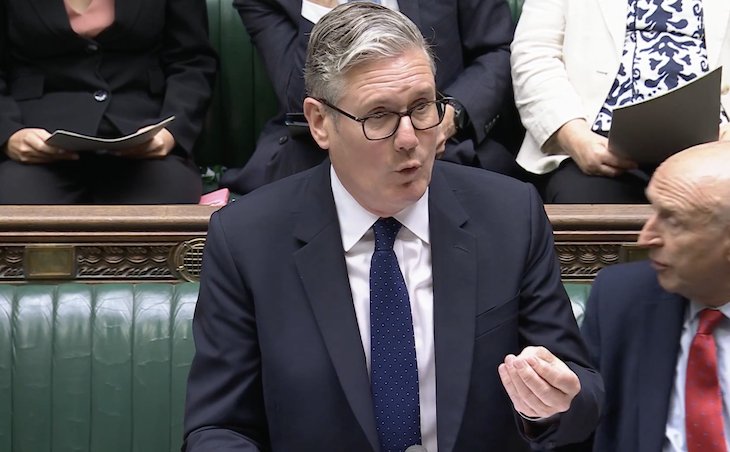
Summer is here – and for some in Labour it cannot come soon enough. After a tricky first year in office, the parliamentary party is in fractious mood. More than 100 of Keir Starmer’s MPs are raging against his welfare cuts; others are fuming about Israel. Some aides in No. 10 hope recess will give the government a much-needed chance to catch its breath. ‘Everyone needs a lie-down,’ says one party manager.
Yet in one corner of Whitehall, summer brings no respite. The Home Office is braced for a season of bad headlines: two more months helplessly watching small boats cross the Channel every day. Warm weather increases the likelihood of such trips. Officials blame an 80 per cent hike in so-called ‘red days’ of balmy temperatures for the 30 per cent jump in these arrivals between April 2024 and April 2025.
It is a phenomenon that risks reducing the Home Secretary, Yvette Cooper, and her fellow ministers to little more than superannuated weathermen. Next Monday, her opposite number, Chris Philp, will stand up in parliament and denounce her record after a year in post. The charge sheet is as follows: 42,000 more arrivals, 700 more boats, asylum–hotel usage up 10 per cent. Even Starmer publicly admits that the situation in the Channel is ‘deteriorating’.
No issue absorbs more of Cooper’s time than that of border security and the asylum system. She chairs a weekly meeting with relevant teams to try to maintain momentum in what is a famously slow-moving department. Talks with ten countries are ongoing about returns-style agreements; five are discussing return hubs too. But like her predecessors, Cooper is learning that at the Home Office, progress is so often just out of reach. ‘Constantly on the verge of great things,’ is the verdict of one in government.
She and David Lammy, the Foreign Secretary, have launched a new joint unit to tackle the problem overseas. Yet even here there are Whitehall tensions. The Home Office believes its rival ought to become more ‘transactional’ and pragmatic in striking migration deals. The Foreign Office wants more detail on the practicalities of return hubs: should they resemble Italy’s deal with Albania? At least there is a mutual enmity for the Treasury: both departments feel short-changed by the spending review.
No issue absorbs more of Yvette Cooper’s time than that of border security and the asylum system
Hopes are pinned on next month’s UK-France summit, when Emmanuel Macron and his wife, Brigitte, will be welcomed to London. Migration will feature prominently on the agenda. Much of the talks will focus on the practicalities of maritime operations and how best to frustrate the vessels involved in crossings. There has also been discussion of a ‘one in, one out’ system: one migrant would be deported in exchange for France sending another individual the other way.
Such a move could be sold as both tough and humanitarian, since it would discourage smuggling gangs and migrants. British officials were not best pleased to discover that the French had confirmed this story to the press – a reminder of competing domestic political pressures. Cynics recognise that, for all the improvement in Anglo-French relations under Starmer, France will never care as much about people leaving its territory as Britain will about people entering. A fortnight ago, Bruno Retailleau, the French interior minister, gave a 25-minute radio interview about immigration and insecurity. Not once did he mention Channel crossings.
Small boats are one challenge to the authority of the British state. The failure to deport criminals is another. A series of high-profile immigration cases have convinced many within Labour that if they do not fix this, it will be right-wing parties that benefit. The cause of reforming the European Convention on Human Rights (ECHR) has been taken up by new Labour MPs Jake Richards, Dan Tomlinson and Mike Tapp.

Their efforts have been welcomed by much of the parliamentary party – including Shabana Mahmood, the Justice Secretary. She is currently examining how the Convention’s protections on torture and family life are frustrating deportations. The question is whether her boss – a man who knows ECHR precedents from memory – is willing to fully back her. ‘As only Nixon could go to China,’ says one MP, ‘so only Starmer can go to Strasbourg.’ A colleague puts it more pithily: ‘If we can’t deport paedophiles then what the fuck are we doing?’
Within Whitehall, there is an appreciation of the risks that come from housing 38,000 asylum seekers in hotels. Some warn of a repeat of the scenes in Southport last summer; others fear the potential for violent crime. Louise Casey’s investigation into rape gangs cited ‘evidence of around a dozen live, complex’ police cases in which ‘a significant proportion of these cases appear to involve suspects who are non-UK nationals who are claiming asylum’.
After a long hot summer will come the autumn party conference season, when the Tories are expected to formally endorse leaving the ECHR. Among Conservatives, there is some frustration that their ‘deportations bill’ – which would exempt foreign nationals from the Human Rights Act – has not received more publicity. ‘It’s much more radical than anything that Reform has proposed,’ says one aide. Australia is the model favoured by senior Tories, owing to its success in turning back small boats in the Indian Ocean in 2013.
Reform, meanwhile, plans to publish its own deportation strategy by early September. Nigel Farage’s party intends to campaign heavily on the theme of a ‘battle of resources’ in which the rights of British citizens are trumped by illegal migrants. The next battleground is Wales, which the devolved Labour government declared was a ‘nation of sanctuary’ in 2019. Reform argues that this status – the first of its kind in the world – affords asylum seekers priority in the queue for social housing. Expect to see more stories about translation costs, unpopular asylum hotels and ‘woke’ waste in the run-up to the Senedd elections next May.
Facing this race to the right, Starmer and Cooper need to not be seen as the embodiment of a tepid, incremental orthodoxy. Both share a disdain for what they consider to be easy answers. But when the current solutions appear so inadequate, easy answers start to look quite attractive.








Comments